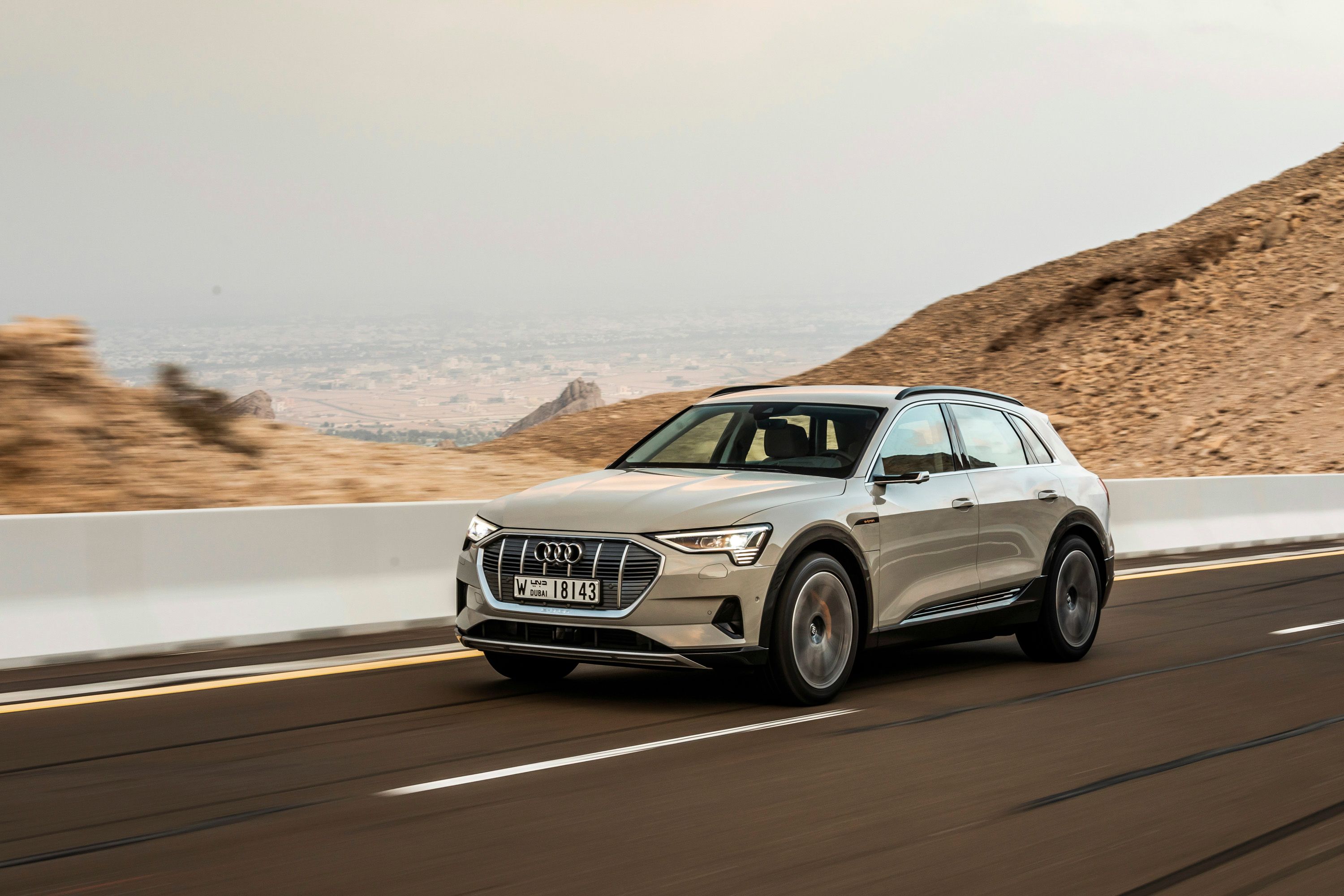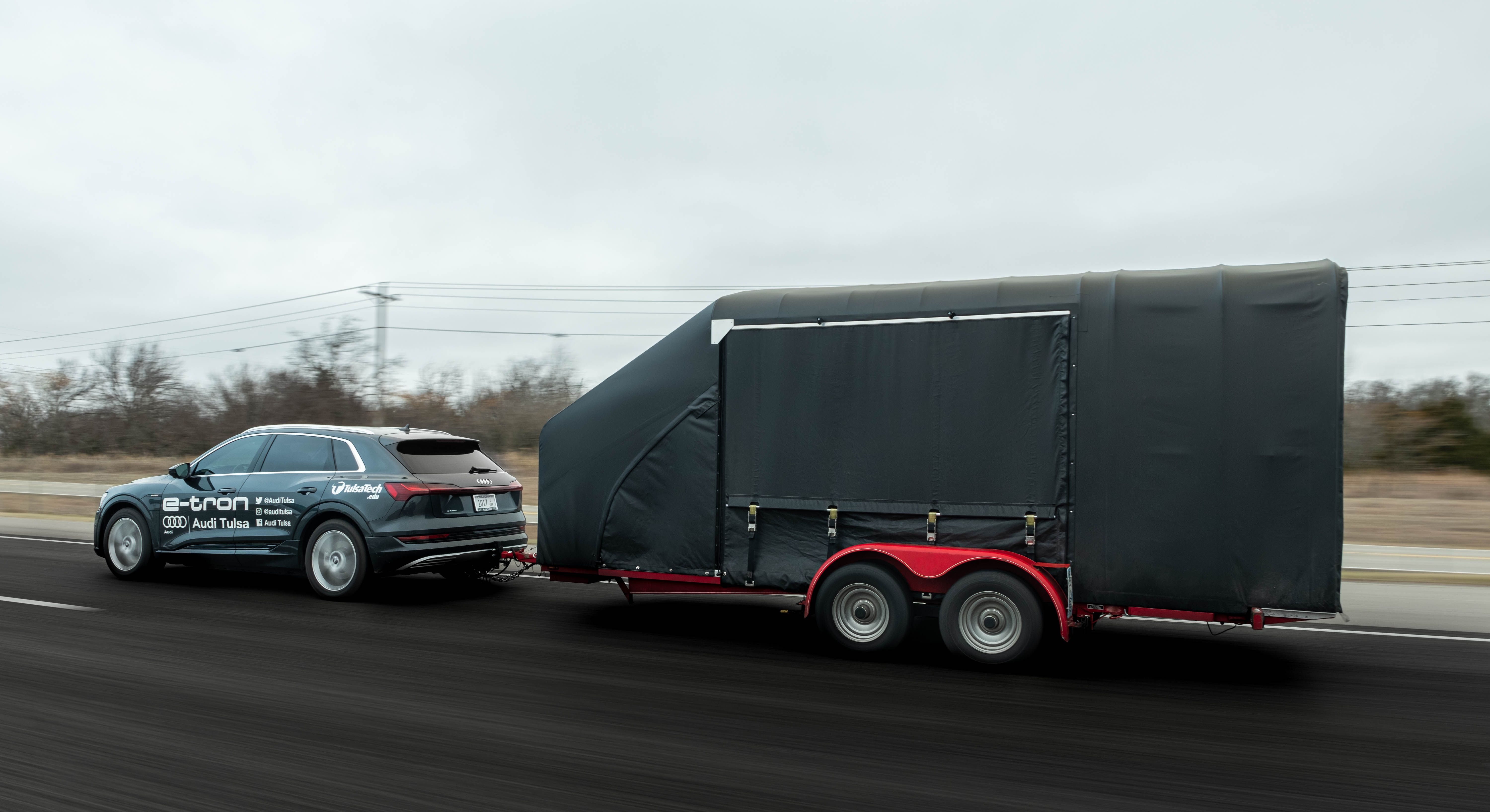Range anxiety is the biggest con of any EV today. Even though companies are constantly improving range figures and charging times, the fear of a depleting battery is still one of the biggest reasons why people are apprehensive to make the shift.
Things get worse when it comes to hauling and towing stuff. Since towing or hauling anything puts extra stress on the powertrain, the range is bound to take a hit; and Audi’s recent experiment just proved the same. So, as far as utility is concerned, EVs still have a long way to go until they replace internal combustion engined SUVs and trucks in all senses.
You Didn’t Know What Range Anxiety Is Until Now
The Audi E-Tron is one of the very few EVs on sale that is rated for towing. The company decided to put it to test by towing a trailer containing a General Motors EV1 from Tulsa, Oklahoma to a Fully Charged Live electric car event at the Circuit of the Americas, just outside Austin, Texas.
The Audi E-Tron is powered by a 95-kWh battery pack, of which only 88-percent is usable. Audi says it has limited battery usability to alleviate battery degradation over time. For the record, the E-Tron has an EPA-rated range of 204 miles on a full charge.
Although Audi did not give the exact figures, it estimates that the average efficiency of the SUV with this trailer was 1.3 miles per kWh. That means that the SUV delivered a range of merely 108.6 miles per charge, after calculating the 88-percent battery availability. That’s almost half of the actual range! Audi said the drive was undertaken under not-so-ideal conditions - 35-degrees, rain throughout, and 60 mph average speed - but that still doesn’t justify the range.
And, mind you, these calculations are based on EPA ratings, which happen to be way more optimistic than the real-world figures.
Audi e-tron trip by the numbers
|
Trailer with payload total weight |
4,000 lbs. |
|---|---|
|
Trip distance |
504 mi. one way |
|
Average trip temperature |
35° F |
|
Trip conditions |
Mostly rain |
|
Average moving speed |
60 mph |
|
Average efficiency with trailer |
1.3 mi/kWh |
Charging Stations Are Not As Common As Fuel Pumps Yet
You can’t deny that the driver must’ve constantly had his eyes on the odometer to see how much juice is left and plan the charge accordingly. I’m not sure if all the charging stations came on the way, but in all likelihood, the driver would’ve had to take detours to reach the stations. The Audi E-Tron was charged at Electrify America DC fast-charging stations along the route. The electric SUV supports 150-kW fast-charging that replenishes the battery to 80-percent in 30 minutes; but is it feasible to take a half an hour break almost every two hours? Unless you’re out to prove someone wrong, I’m sure your answer is no.
Things Are Worse In Case Of Electric Pickup Trucks
To think of it, the Audi E-Tron is an SUV that won’t be used for towing and hauling heavy loads frequently. But, what about pickup trucks? We’ve got a plethora of pickup trucks hitting the market in the next couple of years with higher towing ratings, like the Tesla Cybertruck, Rivian R1T, Hummer EV, Ford F-150 electric, and so on. How will they succeed when they are used to their full limits?
For instance, the Rivian R1T will be offered with a 105-kWh battery pack in the base trim. Rivian has also announced a tow rating of 11,000 pounds, although that could be in the highest trim. Tesla Cybertruck in the base trim has a rating of 7,500 pounds. So, if Rivian also was to offer 7,500 pounds with a 105-kWh battery pack, the performance will be worse than the E-Tron’s when driven with maximum towing capacity.
Since all the trims of the R1T will be offered with a four-motor setup, chances are the 105-kWh battery pack trim could come with an 11,000-pound towing rating. That will deliver less than 100 miles on a full charge. So, there is a cloud of doubt whether electric trucks are ready to replace ICE trucks. There is no doubt that towing will be a lot easier than what it is today, thanks to the torque available from the go, but are you ready to compromise and take frequent breaks to charge the truck and, therefore, increase your trip’s duration?
Final Thoughts
Automakers are already in a fix to create the perfect balance between performance, range, and towing capacity, and it could take a while before some breakthrough technology solves these problems. If you were looking to purchase a pickup that will be used as a work truck, would you opt for an electric truck? Share your thoughts in the comments section below.


